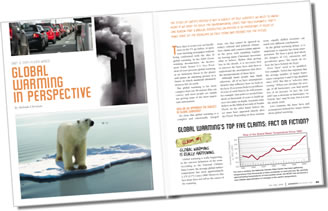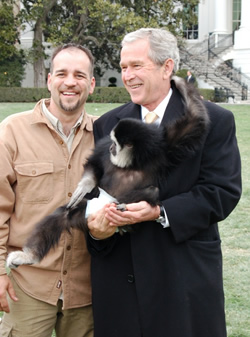Our Earthly Home by Pam Sheppard, AiG–U.S.
A good place to start when trying to discern the facts about global warming is to look at the context of earth history—its past (beginning with creation), its present, and its future. Creation scientists have completed much research on the effects of major earth-shaping events like the global Flood and the catastrophic events that followed.
 Our
earthly home takes center stage in the October–December
issue of Answers magazine. This fact-filled issue
provides Christians the needed context in order to
properly interpret the claims of global warming. Here is
a preview of some of the must-read articles you will
find in this relevant issue about our earth in the
beginning, during and after the global Flood, and in the
future:
Our
earthly home takes center stage in the October–December
issue of Answers magazine. This fact-filled issue
provides Christians the needed context in order to
properly interpret the claims of global warming. Here is
a preview of some of the must-read articles you will
find in this relevant issue about our earth in the
beginning, during and after the global Flood, and in the
future:
The Created World
- “Thirty Miles of Dirt in a Day” — Were the 4,000 feet (1.2 km) of flat-lying sedimentary rock layers in Grand Canyon laid down during the global Flood? Or, were much of the geologic layers formed during Day Three of the Creation Week? Geology specialist Dr. Andrew Snelling explores this fascinating question in his article.
- “Mature for Her ‘Age’” — Just how old does God’s creation appear to be? How old did the first animals and humans look? Answers in Genesis’s Ken Ham addresses this much asked question about age vs. maturity.
- “Bara-What?” — When Adam named all the animals that God created, it must have taken a long time. Well, not as long as many might think. He only had to name the original “kinds” of animals which did not include all the modern animals we see today. A new field of biology, called baraminology, seeks to find what those original kinds were.
World Underwater
- “Sinking a Floating Forest” — A continent-sized forest that once floated on the water? Could it have existed at one time and then buried during the Flood of Noah’s day? Don’t miss this article by paleontologist Kurt Wise to find out what he discovered about this unique ecosystem that has been preserved in the fossil record.
- “Time for an Upgrade?” — What happens when you discover that the ideas and theories about the earth’s rock record that you once held on to no longer match recent findings in creation science? Well, it could mean that it is time to consider upgrading your model. British researcher Paul Garner takes you through his journey of discovery as he explored the Catastrophic Plate Tectonics (CPT) model.
- “F.A.S.T. and Furious” — Through the Institute for Creation Research’s FAST project, (Flood-Activated Sedimentation and Tectonics), creation geologists are increasing their understanding of how the Flood deposited sediments across continents while tectonic forces within the crust reshaped the earth’s surface. This is yet another example of creation research that magnifies the Creator.
Post-Flood World
- “Continuing Catastrophes” — The Flood of Noah’s day was a major catastrophic event that changed earth drastically. But does it account for all the fossils and landforms we see today? Geologists like Dr. John Whitmore now believe that a series of major post-Flood catastrophes are responsible for much of the surface landforms and many of the highest fossils we find today. Whitmore explains the past, present, and future catastrophes that remind us of the Curse’s effect on our earthly home.
- “A Dark and Stormy World” — What kind of world did Noah and his family step into after surviving a worldwide Flood? Based on what was going on in the atmosphere, the ocean, and the earth’s crust, it was a recipe for disaster. An expert in atmospheric science, Dr. Larry Vardiman, discusses the stormy world that Noah and his family experienced and what it tells us about climate change today.
Our Future World?
- “Global Warming in Perspective” —“Humans are causing the earth to heat up.” “Polar bears have to leave their icy homes.” “The oceans are rising.” Just what is a Christian to believe about the claims of global warming? Speaking to various experts in atmospheric science, Melinda Christian takes an in-depth look at the top five claims of this hot topic.
Also, you won’t want to miss these additional articles, as well as the latest science and culture news, tips for creation evangelism, and much more:

Dan Breeding’s ministry, Creatures of Creation, has taken him to a number of places, including the White House. During the Easter Egg Roll festivities, he brought along his gibbon, Leeza. She is just one of the nearly 40 wild animals he owns and cares for.
- “Leapin’ Lemurs” — Families will enjoy learning more about the fun-loving, treetop-dwelling lemur. Look for this article as a sneak peek next week! Subscribers, when you receive your magazine, use your code from inside the front cover to gain access to a subscriber-exclusive video showing Buddy Davis with wildlife educator Dan Breeding and his lemur, Maddy.
- “Loving Science, Loving God” — Dr. Kurt Wise and Dr. Gregg Allison share what it’s like to love science and love God, showing how Christians can bring further glory to God by digging deeper into his marvelous creation.
- “Looking Back and Moving Forward” — When did creation scientists first introduce a young-earth interpretation of Genesis? Two Ph.D. scientists, Andrew Snelling and Todd Wood take a look at the history and future of the creation movement.
-
“Sand Transported Cross Country” — Dr. Andrew
Snelling presents more compelling geologic evidence
for the Genesis Flood in part 4 of his article
series on the six main evidences for the Genesis
Flood.
Kids Answers and Chart
Kids will love learning the facts about dinosaurs and fossils. The poster of the fierce-looking Utahraptor will surely find its way on bedroom walls. Parents will enjoy using the teaching points presented on the back to show their children that the Bible is the key to understanding the past, present, and the future. And it helps explain the fossils of dinosaurs we find today.
The pull-out chart shows that creationists really do embrace science. Five successful predictions by creation scientists are presented in a lay-friendly format. This makes for a great discussion starter about recent discoveries about our young earth. Also, don’t forget to visit KidsAnswers.org—a family-friendly, safe site part of the Answers in Genesis and Answers magazine family of websites—for free videos, downloads, and activities!
http://www.answersingenesis.org/articles/2008/09/09/our-earthly-home